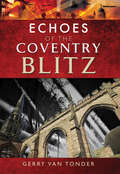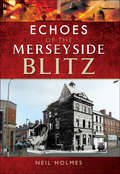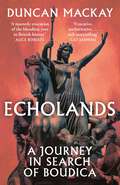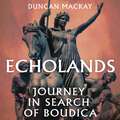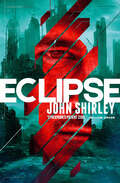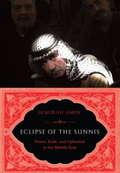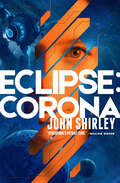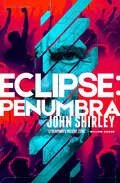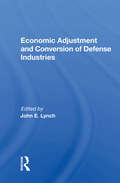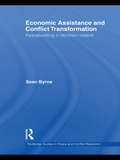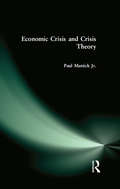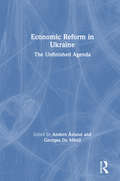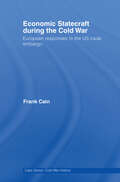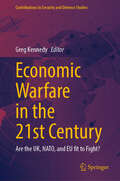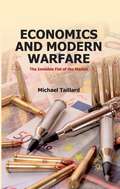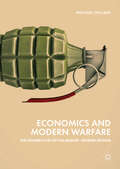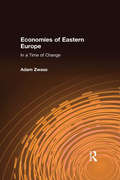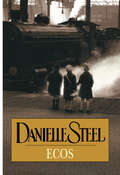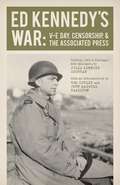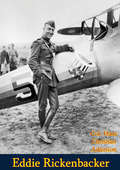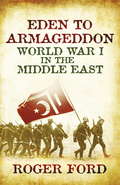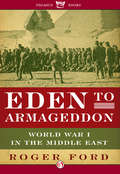- Table View
- List View
Echoes of the Coventry Blitz (Echoes Of The Blitz Ser.)
by Gerry van TonderSmoke rises in the City of Three Spires, the smouldering remnant of the Nazi hate. Coventry and England will remember and repay.From August 1940, Hitlers Luftwaffe mercilessly and indiscriminately bombed cities and towns in Britain. The historic West Midlands city of Coventry did not escape the carnage as, night after night, high-explosive and incendiary bombs rained down on the hapless production centre of cars, munitions and aero engines.Today, the iconic shell of Coventrys once majestic medieval cathedral offers a silent memorial of remembrance to that dreadful night. For the citys residents of now, it is a poignant echo of a violent and destructive part of their history.With carefully selected photographs, Gerry van Tonder tells the story of Coventrys blitz through a series of ghost photographs, where historic wartime images are blended with their modern counterpart to create a fascinating window in to Coventrys past. Also drawing from contemporary press accounts of the Coventry Blitz, this book presents a totally unique comparative insight into the Nazi bombing of Coventry in the Second World War.
Echoes of the Merseyside Blitz (Echoes Of The Blitz Ser.)
by Neil HolmesMerseyside has a long and varied history, one which its sons and daughters are justifiably proud. It has come through many struggles, but perhaps its darkest hour was the air raids that were launched against it in 1940 and 1941. Around 4,000 people lost their lives and many prominent buildings and houses were destroyed or damaged beyond repair. All of this occurred in the space of just 18 months, a period which changed the face of the region irrevocably. Using a variety of new sources Echoes of the Merseyside Blitz draws together a timeline of the blitz for the whole region, showing at a glance what was happening on any given night during that period. Taking carefully selected photographs, Neil Holmes tells the story of Merseysides blitz through a series of ghost photographs, where historic wartime images are blended with their modern counterpart to create a fascinating window in to Merseysides past.
Echolands: A Journey in Search of Boudica
by Duncan MackayAlmost 2000 years ago, Boudica led the greatest rebellion Britain has ever seen. Within the space of a single blood-soaked year, she united the tribes to deliver blow after devastating blow to the Roman regime, culminating in a brutal, decisive battle.Archaeologist Duncan Mackay has spent a lifetime on the trail of Boudica. Beginning near his home in Norfolk, in the heart of Boudica's tribal territory, he embarks on a journey in the footsteps of Romans and Britons, exploring their villages, towns, forts and roads. The passage of two millennia has buried the world that Boudica knew, but Duncan finds that its echoes and physical traces still surround us - as long as you know where to look. The armies marched along the roads we still use, and died in their thousands in towns, cities and countryside where we still live today. The site of Boudica's last battle was long believed be lost to time, but the threads of the story all pull towards one remarkable, forgotten little corner of the English landscape.From the Breckland of Norfolk to the back streets of Colchester, from the remotest corner of Anglesey to the depths of the London Underground, Duncan takes us back two thousand years to retell the story of Britain's bloodiest year. Fusing ancient history, modern excavation, landscape exploration, and vivid reconstruction, Echolands weaves the long-lost tapestry of Boudica's war.
Echolands: A Journey in Search of Boudica
by Duncan MackayAn original, revelatory, enthralling narrative history of how Queen Boudica led the greatest rebellion Britain has ever seen. <p><p>Almost 2000 years ago, Boudica led the greatest rebellion Britain has ever seen. Within the space of a single blood-soaked year, she united the tribes to deliver blow after devastating blow to the Roman regime, culminating in a brutal, decisive battle. <p><p>Archaeologist Duncan Mackay has spent a lifetime on the trail of Boudica. Beginning near his home in Norfolk, in the heart of Boudica's tribal territory, he embarks on a journey in the footsteps of Romans and Britons, exploring their villages, towns, forts and roads. The passage of two millennia has buried the world that Boudica knew, but Duncan finds that its echoes and physical traces still surround us—as long as you know where to look. The armies marched along the roads we still use, and died in their thousands in towns, cities and countryside where we still live today. The site of Boudica's last battle was long believed be lost to time, but the threads of the story all pull towards one remarkable, forgotten little corner of the English landscape. <p><p>From the Breckland of Norfolk to the back streets of Colchester, from the remotest corner of Anglesey to the depths of the London Underground, Duncan takes us back two thousand years to retell the story of Britain's bloodiest year. Fusing ancient history, modern excavation, landscape exploration, and vivid reconstruction, Echolands weaves the long-lost tapestry of Boudica's war. <p>(P) 2023 Hodder & Stoughton Limited
Eclipse (The Eclipse Trilogy)
by John ShirleyA former rock star fights a fascist private army in a war-torn future Europe in this &“chillingly plausible&” and prescient science fiction classic (Kirkus Reviews). It is 2039, and parts of Europe have been annihilated by tactical nukes and Russian aggression. As the chaos of a third world war rages, the Second Alliance smells an opportunity. They present themselves as a large multinational capable of creating some much-needed order. In reality, they are an organization of racists and theocrats with a very specific idea of &“order&” in mind—led by an ambitious televangelist, staffed with mercenaries, and harboring a dangerous cult within its ranks. Using media manipulation and propaganda, they gain power in the United States, in a pioneering space colony, and on an artificial island known as Freezone. But the New Resistance recognizes the SA for what it really is. And Rick Rickenharp—a once-famous guitarist hanging around the underground clubs—is about to play an unexpected role in their cause . . . Originally published in 1985 and updated by the author in 2012, Eclipse is the first book in an extraordinary trilogy by a visionary science fiction talent. &“Spiky prose [hooks] the reader&’s attention . . . a Goya-esque vision of war-torn western Europe, bombed out and unstable . . . from a resurgence of Russian militarism and the collapse of NATO.&” —Publishers Weekly &“[John Shirley is] cyberpunk&’s Patient Zero.&” —William Gibson
Eclipse of the Sunnis: Power, Exile, and Upheaval in the Middle East
by Deborah AmosAn award-winning NPR correspondent illuminates the flipside of the Shia revival?the dislocation and destabilization of the Sunni Muslims?and its impact on the Middle East
Eclipse: Corona (The Eclipse Trilogy)
by John ShirleyThe conclusion of the visionary cyberpunk saga by &“one of SF&’s most singular talents&”—a portrait of a near-future battle against a new totalitarianism (William Gibson, New York Times–bestselling author of The Peripheral). America has finally turned against the fascist Second Alliance—but Europe remains in the crosshairs of the multinational corporation&’s terrifying genocidal plans. Their masterful use of media and technology to spread their hateful propaganda has positioned them to begin their final assault with little resistance—except from a band of warriors prepared to fight back from the keyboards to the killing fields. Now a new, fragile alliance is forming between two historically bitter enemies as Israeli and Muslim guerillas band together to defeat a common enemy—and save humanity from the darkness . . . &“[An] apocalyptic, pop-inflected, rock-driven vision.&” —William Gibson &“John Shirley&’s prophet-in-the-cyberwilderness voice deserves high billing among the best.&” —Roger Zelazny, Nebula Award–winning author of Nine Princes in Amber
Eclipse: Penumbra (The Eclipse Trilogy)
by John ShirleyThe second volume in the trilogy—&“a complex, bizarre, and unique vision of the near future with a kaleidoscopic mix of politics, pop, and paranoia&” (Bruce Sterling, author of The Hacker Crackdown). World War Three continues. A nuclear strike has laid waste to much of Europe. And the fascists and fundamentalists of the Second Alliance are diligently working on Project Total Eclipse—a nightmare scenario that seeks to establish the SA&’s control over a much wider territory through a takeover of the first orbiting space colony in human history. And they are running out of patience with the New Resistance—technologically skilled guerillas who are the only ones standing in the way of their grand plans for apartheid and world domination . . . This extraordinary trilogy, which anticipated such phenomena as surveillance drones and the rising threat of right-wing authoritarianism, is a riveting saga of out-of-control corporate power, a near-future world riven by rage and fear, and the need for individuals to stand up and fight back if they want to hold on to their freedom. &“Vivid, dense, powerful imagery . . . hard to put down.&” —The Washington Post
Eclipse: The Last Days of the CIA
by Mark PerryExplains events in Nicaragua and negotiations with Noriega.
Economic Adjustment And Conversion Of Defense Industries
by John E. LynchDefense plant cutbacks and military base closures have affected hundreds of U.S. communities during the past twenty-five years. Tracing the recovery of four communities after large defense plant cutbacks and of one hundred communities after military base closures, the contributors analyze the transition from the production of military to civilian goods. The contributors examine the market potential of reusing defense industrial plants to produce civilian products within the one- to two-year period called for by economic conversion proponents, showing that the complex process needed to develop, test, and market an entirely new product requires a minimum of five years. They also review the wide range of economic development techniques available at the state and local level, conversion approaches in Western Europe, programs for displaced workers, and reasons why the economic conversion approach has failed to attract public support in the United States. The case studies are used to formulate an integrated, composite approach for coping with plant closures and major employment dislocations. Stressing the in portance of community-based economic adjustment activities, this book will be valuable to all concerned with mitigating the effects of military and civilian plant closures.
Economic Assistance and Conflict Transformation: Peacebuilding in Northern Ireland (Routledge Studies in Peace and Conflict Resolution)
by Sean ByrneThis book examines the role of economic aid in the management and resolution of protracted ethnic conflicts, focusing on the case study of Northern Ireland. The book describes the results of a study of the role of economic aid within Northern Ireland, through the viewpoints of citizens collected in an opinion poll as well as community group leaders whose projects received funding, funding-agency civil servants and development officers. The study explains the importance of economic and social development in promoting cross-community contact as well as within single-identity communities, and the need for a multitrack intervention approach to transform the conflict in Northern Ireland. It makes an important contribution to our understanding of how economic assistance impacts on a divided society with a history of protracted violence and provides important perspectives on the "peace through development" idea. One of the key unanswered questions relating to economic aid and preventing future violence is that of the significance of external economic aid in building peace after violence. By examining the respondents’ political imagery, this book expands on existing work on economic aid and peace building in other societies coming out of violence. Northern Ireland’s changing social-economic and political context reflects the fact that economic aid and sustainable economic development is a cornerstone of the peacebuilding process. The goal of the book is to provide a foundational knowledge base for students and practitioners about the role of economic aid in building the peace dividend in post-accord societies. The book will be of great interest to students of conflict resolution, peacebuilding, Irish politics, peace and conflict studies, and politics and IR in general.
Economic Crisis and Crisis Theory
by Paul Mattick Jr.Keynesian economics claimed to have overcome the problem of economic depressions. However, as Mattick argues that crises are inherent within capitalism and that neither the market nor Keynesianism can stop "the steady deterioration of the economy". Written in 1974, Economic Crisis and Crisis Theory is one of Mattick's most valuable contributions to the Marxist critique of political economy and radical theory in general.
Economic Reform in Ukraine: The Unfinished Agenda
by Anders Aslund Georges De MenilUkraine may have taken a "gradualist" approach to economic reform, but the results have been no better than in Russia. The editors have assembled the leading specialists on the Ukrainian economy, including officials from major Ukrainian and international economic institutions, to outline the major problems of the economy, analyze the initial phases of economic reform in Ukraine, assess their outcomes, and chart the way forward.
Economic Statecraft during the Cold War: European Responses to the US Trade Embargo (Cold War History)
by Frank CainDiscussing a rarely researched aspect of the Cold War, this volume uses new material to examine how the United States trade embargo on the Soviet Union and communist China severed relationships with Europe, particularly focusing on Great Britain. In the late 1940s, the US government stopped nearly all exports to the entire Sino-Soviet bloc in the belief that it would hinder the expansion of Soviet and Chinese military potential. To continue receiving the US Marshall Aid, European countries had to impose similar bans, but were reluctant because their trade links with the USSR and its satellite countries had existed for centuries. The US thereafter negotiated with Europe about what to include or exclude from the list of authorised goods, severely straining diplomatic relations. Economic Statecraft during the Cold War details these negotiations, casting new light on the ambivalent US-UK relationship and providing insights into the changing emphasis between the Republican and Democrat administrations on the key question of trade embargo, by explaining how the firm consistency in the application of the US policy over the succeeding decades of the Cold War was maintained. This book will be of much interest to all students and scholars of Cold War history, intelligence studies and international history in general.
Economic Warfare in the 21st Century: Are the UK, NATO, and EU fit to Fight? (Contributions to Security and Defence Studies)
by Greg KennedyThis volume critically examines whether the United Kingdom, NATO, and the EU are equipped to engage in both defensive and offensive economic warfare. In an era where economic leverage is increasingly used as a tool of statecraft, nations worldwide are struggling with the complexities of economic warfare. The book discusses contested terminology and concepts, often blurred with geoeconomics, economic statecraft, and weaponized interdependence. Through a thorough analysis of organizational structures, doctrines, and strategic cultures, the book explores the legitimacy and implications of using economic means to influence state behavior. As global actors ramp up their economic warfare capabilities, it questions whether such strategies are a necessary evolution or a disruptive force to international norms. The book will appeal to students, researchers, and scholars of international relations, political science, security studies, and defence studies, as well as policy-makers and practitioners interested in a better understanding of the future of global economic security.
Economics and Modern Warfare: The Invisible Fist of the Market
by M. TaillardBy referring to a handful of battles throughout history, a new form of military strategy is derived through the manipulation of supplies, capital, and markets. This book combines economic theory with applied analyses of military successes and failures, explaining them simply for audiences of all levels of interest.
Economics and Modern Warfare: The Invisible Fist of the Market
by Michael TaillardThis book demonstrates how economic tools have been used throughout history to accomplish goals of military conflict, how they can be used more effectively than traditional means of warfare in the modern era, and how we can derive a better understanding of economic strategy applicable not just to the military but also to market competition. This new edition includes a thorough updating of chapters on advances in our understanding of economic warfare and more recent examples, such as ISIS’s reliance on obtaining control over oil production facilities, North Korea’s nuclear program, and China’s emphasis on scientific research and technological innovation. This edition also features an entirely new chapter on the commercialization of the conflict over the region of Kashmir.
Economies of Eastern Europe in a Time of Change: In A Time Of Change
by Adam ZwassThe development and use of the atomic bombs at Hiroshima and Nagasaki number among the formative national experiences for both Japanese and Americans as well as for 20th-century Japan-US relations. This volume explores the way in which the bomb has shaped the self-image of both peoples.
Ecos
by Danielle SteelEn el verano de 1915, durante la Primera Guerra Mundial, los Wittgenstein, patriarcas de una rica familia judía alemana, consiguen reunir a todos sus miembros para disfrutar juntos en Suiza de unos días lejos de la tragedia cotidiana de la guerra. Ninguno sospecha que aquel verano iba a ser el último de una vida feliz, acomodada y sin problemas graves.Poco después, Beata, la hija mayor, cae irremediablemente en las redes del amor. Pero se trata de un amor prohibido con un oficial francés católico. Esta relación, que los dos amantes defienden frente a todos, terminará dividiendo a la familia. Dos décadas más tarde, Beata deberá enfrentarse con la aterradora amenaza que significa Hitler para sus seres queridos y sobre todo para su hija Amadea.Historia de tres generaciones de mujeres marcadas por sus pasiones y sentimientos, entre la sociedad europea más elegante y la horrenda desesperación de la guerra, Ecos invita al lector a compartir una experiencia cálida, emocionante e inolvidable.«Una historia conmovedora sobre el amor y la pérdida.»Booklist
Ecos (Best Seller (debolsillo) Ser.)
by Danielle SteelLa historia de tres generaciones de mujeres marcadas por sus pasiones y sentimientos y por la horrenda desesperación de la Primera Guerra Mundial. En el verano de 1915, durante la Primera Guerra Mundial, los Wittgenstein, patriarcas de una rica familia judía alemana, consiguen reunir a todos sus miembros para disfrutar juntos en Suiza de unos días lejos de la tragedia cotidiana de la guerra. Ninguno sospechaba que aquel verano iba a ser el último de una vida feliz, acomodada y sin problemas graves. Poco después, Beata, la hija mayor, cae irremediablemente en las redes del amor. Pero se trata de un amor prohibido con un oficial católico. Esta relación, que los dos amantes defienden frente a todos, terminará dividiendo a la familia. Dos décadas más tarde, Beata deberá enfrentarse con la aterradora amenaza que significa Hitler para sus seres queridos y sobre todo para su hija Amadea. Ecos invita al lector a compartir una experiencia cálida, emocionante e inolvidable. La crítica ha dicho... «Una historia conmovedora sobre el amor y la pérdida.» Booklist
Ed Kennedy's War: V-E Day, Censorship, and the Associated Press (From Our Own Correspondent)
by John Maxwell Hamilton Ed Kennedy Julia Kennedy Cochran Tom CurleyOn May 7, 1945, Associated Press reporter Ed Kennedy became the most famous -- or infamous -- American correspondent of World War II. On that day in France, General Alfred Jodl signed the official documents as the Germans surrendered to the Allies. Army officials allowed a select number of reporters, including Kennedy, to witness this historic moment -- but then instructed the journalists that the story was under military embargo. In a courageous but costly move, Kennedy defied the military embargo and broke the news of the Allied victory. His scoop generated instant controversy. Rival news organizations angrily protested, and the AP fired him several months after the war ended.In this absorbing and previously unpublished personal account, Kennedy recounts his career as a newspaperman from his early days as a stringer in Paris to the aftermath of his dismissal from the AP. During his time as a foreign correspondent, he covered the Spanish Civil War, the rise of Mussolini in Italy, unrest in Greece, and ethnic feuding in the Balkans. During World War II, he reported from Greece, Italy, North Africa, and the Middle East before heading back to France to cover its liberation and the German surrender negotiations. His decision to break the news of V-E Day made him front-page headlines in the New York Times. In his narrative, Kennedy emerges both as a reporter with an eye for a good story and an unwavering foe of censorship. This edition includes an introduction by Tom Curley and John Maxwell Hamilton, as well as a prologue and epilogue by Kennedy's daughter, Julia Kennedy Cochran. Their work draws upon newly available records held in the Associated Press Corporate Archives.
Eddie Rickenbacker
by Colonel Hans Christian AdamsonA gripping biography of Eddie Rickenbacker, an American fighter ace in World War I and Medal of Honor recipient, who lived on the frontline of aviation, military and civilian.Written by his close friend Colonel Hans Christian Adamson, this book contains a fascinating look at Rickenbacker's rise from Columbus, Ohio to becoming the leading American Ace of World War I and aviation icon. A daredevil from an early age, he was fascinated by machines of all kinds but especially aeroplanes. He enlisted in the U.S. army as early as he could in 1917 and arrived in France in June 1917, initially he was thwarted in his efforts to get his 'wings' by officers who wanted to retain him as a ground based mechanic. However, his rise to 'ace' status was rapid once he got into the air. Having only shot down his first enemy aircraft on the 29 April 1918, by the end of the war he had claimed 26 victories and become commander of the famous 'Hat-In-the-Ring' squadron. The inter-war years saw Rickenbacker cement his relationship with Eastern Air Lines, which he would one day lead, and a number of forays into motor racing. His service in World War II saw him range far and wide on missions across America and further afield to Russia; during one of his inspection tours his B-17 Flying Fortress was forced to ditch in the Pacific Ocean. In his most famous death-defying feat Rickenbacker, Adamson and a few of the crew survived adrift in life rafts for 24 days; held together by Rickenbacker's leadership they were rescued on November 13 off the coast of Nukufetau in Tuvalu.A highly recommended biography of one of American Aviation's greatest heroes.
Eden To Armageddon: World War I The Middle East
by Roger FordTurkey, the First World War and the making of the Middle East.The Great War in the Middle East began with the invasion of the Garden of Eden, and ended with a momentous victory on the site of the biblical Armageddon. Almost incredibly, the whole story of this epic war has never been told in a single volume until now. In this important new history Roger Ford describes a conflict in its entirety: the war in Mesopotamia, which would end with the creation of the countries of Iran and Iraq; the desperate struggle in the Caucasus, where the Turks had long-standing territorial ambitions; the doomed attacks on the Gallipoli Peninsula that would lead to ignominous defeat; and the final act in Palestine, where the Ottoman Empire finally crumbled. He ends with a detailed description of the messy aftermath of the war, and the new conflicts in a reshaped Middle East that would play such a huge part in shaping world affairs for many generations to come.
Eden To Armageddon: World War I The Middle East
by Roger FordTurkey, the First World War and the making of the Middle East.The Great War in the Middle East began with the invasion of the Garden of Eden, and ended with a momentous victory on the site of the biblical Armageddon. Almost incredibly, the whole story of this epic war has never been told in a single volume until now. In this important new history Roger Ford describes a conflict in its entirety: the war in Mesopotamia, which would end with the creation of the countries of Iran and Iraq; the desperate struggle in the Caucasus, where the Turks had long-standing territorial ambitions; the doomed attacks on the Gallipoli Peninsula that would lead to ignominous defeat; and the final act in Palestine, where the Ottoman Empire finally crumbled. He ends with a detailed description of the messy aftermath of the war, and the new conflicts in a reshaped Middle East that would play such a huge part in shaping world affairs for many generations to come.
Eden to Armageddon
by Roger FordThe definitive and epic account of World War I in the Middle East The Great War in the Middle East began with an invasion of the Garden of Eden, and ended with a momentous victory on the site of the biblical Armageddon. For the first time, the complete story of this epic, bloody war is now presented in a single, authoritative volume.
